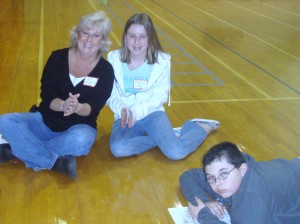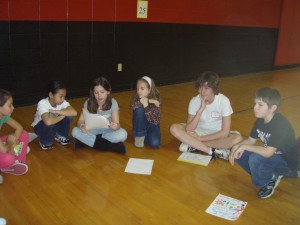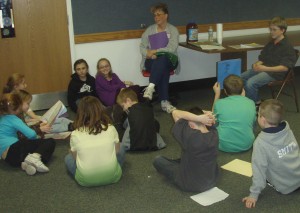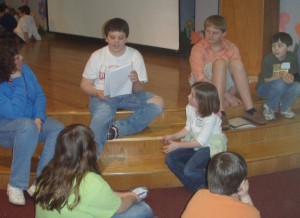Day 5 of our Twain WebQuest began with a review of the elements of humor we took notes over yesterday. Then Mrs. Scales pulled out an old college paper she had written on the Twain story we had all listen to last week, “The Jumping Frog of Calaveras County”. She showed us how she had analyzed and written a response to the story pointing out different literary devises Twain had used. She had a very good example of how to use supporting details from the text of the story. After reviewing the elements of comedy that Twain had used in “The jumping Frog of Calaveras County” each group had to pick one of the other short stories by Twain to read and review.
Mrs. Scales point out that the writing assignment for Day 5 and 6 of the webquest is an essay and therefor has one topic. The topic for this assignment is to review the type of humor used in the Twain story we selected to read as a group. It was explained that the assignment does NOT ask for a plot summary or review of what happens in the story.
Once again, we reviewed the parts of the essay that we will be graded on:
Ideaswill be evaluated based on the correct identification and explanation of the types or elements of humor used.
Organization will be graded on our essay having a strong Introduction, Body, and Conclusion.
Voice will be evaluated on how the tone or voice of the authors come through.
Word Choice the use of precise, accurate, varied, and rich words to communicate will be scored.
Sentence Fluency how the writing flows together in well structured, correct, well flowing sentences will be evaluated.
Conventions will be graded based on the mechanical correctness of the spelling, grammar, punctuation, and English language rules. This includes the title of the short story and the author’s name being written properly in the essay.
Following are guidelines for punctuating titles according to Modern Language Association (MLA) standards.
There is a trick to remembering how to treat titles, and it works well enough that you can commit most types of titles to memory.
It’s the big and little trick.
Big things and things that can stand on their own, like books, are italicized. Little things that are dependent or that come as part of a group, like chapters, are put into quotation marks.
For example, a CD or album are major (big) works that can be divided into smaller parts, or songs. The song names (small part) are punctuated with quotation marks.
For example:
•The Sweet Escape, by Gwen Stefani, includes the song “Wind It Up.”
Underline any published collection, like a book of poetry. Put the individual entry, like a poem, in quotation marks. However: a long, epic poem that is often published on its own would be treated like a book. The Odyssey is one example.
Punctuating Titles of Works of Art
Creating a work of art is an enormous task, isn’t it? For that reason, you can think of art as a big accomplishment. Okay, that might sound corny, but it will help you remember! Individual works of art like paintings and sculptures are underlined or italicized:
•Michelangelo’s David
•Mona Lisa
•The Last Supper
•The Pieta
Note: A photograph, which is much smaller than a work of art, is placed in quotation marks!
Titles and Names to Italicize
•A novel
•A ship
•A play
•A film
•A painting
•A sculpture or statue
•A drawing
•A CD
•A TV Series
•A cartoon series
•An encyclopedia
•A magazine
•A newspaper
•A pamphlet
Titles to Put Into Quotation Marks
•Poem
•Short story
•A skit
•A commercial
•An individual episode in a TV series (like “The Soup Nazi” on Seinfeld)
•A cartoon episode, like “Trouble With Dogs”
•A chapter
•An article
•A newspaper story
More Tips on Punctuating Titles
Some titles are merely capitalized and not given additional punctuation. These include:
•Religious works, like The Bible or The Koran
•Buildings
•Monuments
We put notes on the big and little trick in our W-R’s notebooks to refer back to when needed.
Our root word for today was fac, which means to make or do. We used factory, faculty, and facilitate as our three example words.
As a whole 7th grade we are at 57% of the students having all of their AR points for this grading period. Fourth period is still in the lead with 71%.



